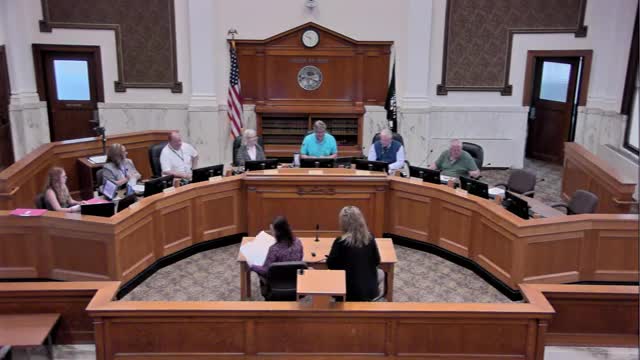Camp Ripley reveals ambitious plans for growth and readiness
June 19, 2024 | Crow Wing County, Minnesota

This article was created by AI summarizing key points discussed. AI makes mistakes, so for full details and context, please refer to the video of the full meeting. Please report any errors so we can fix them. Report an error »

During a recent government meeting, Colonel Troy Fink, garrison commander of Camp Ripley, provided an extensive update on the operations and developments at the military training facility located in central Minnesota. The meeting highlighted the importance of community relations and partnerships, which Colonel Fink emphasized as critical to the base's mission.
Colonel Fink introduced the leadership of the Minnesota Army National Guard, including Major General Sean Manky and Major General Charles Kemper, who is currently deployed. He noted that the 34th Infantry Division, based out of Arden Hills, is expected to return in November after their deployment.
A significant focus of the update was on Camp Ripley's economic impact on the surrounding counties, with Colonel Fink detailing the employment generated by the base and its contributions to local economies. He also provided insights into the facility's capabilities, noting its classification as a level 2 training center, which allows for heavy maneuver and aviation operations.
The meeting also covered ongoing construction projects at Camp Ripley, including a new rail spur aimed at enhancing mobilization efficiency for the Minnesota National Guard. This infrastructure improvement is expected to reduce the time required to mobilize units from 14 days to approximately 3-4 days.
Additionally, Colonel Fink announced plans for a new 40,000 square foot museum at Camp Ripley, with construction set to begin in mid to late July. The museum is anticipated to take 18 to 24 months to complete and will serve as a significant addition to the facility.
The training schedule for 2024 was also discussed, with Colonel Fink noting that June is particularly busy due to artillery training exercises. He mentioned the arrival of the Exportable Combat Training Capability (XCTC) teams in July, which will bring additional personnel and activity to the area.
Finally, Colonel Fink highlighted the collaborative efforts with various state agencies, including the Minnesota Department of Natural Resources and the Minnesota Department of Transportation, which utilize Camp Ripley for training purposes. He concluded by addressing the support services available for soldiers and their families, emphasizing the importance of mental health and financial counseling resources provided at the base.
Colonel Fink introduced the leadership of the Minnesota Army National Guard, including Major General Sean Manky and Major General Charles Kemper, who is currently deployed. He noted that the 34th Infantry Division, based out of Arden Hills, is expected to return in November after their deployment.
A significant focus of the update was on Camp Ripley's economic impact on the surrounding counties, with Colonel Fink detailing the employment generated by the base and its contributions to local economies. He also provided insights into the facility's capabilities, noting its classification as a level 2 training center, which allows for heavy maneuver and aviation operations.
The meeting also covered ongoing construction projects at Camp Ripley, including a new rail spur aimed at enhancing mobilization efficiency for the Minnesota National Guard. This infrastructure improvement is expected to reduce the time required to mobilize units from 14 days to approximately 3-4 days.
Additionally, Colonel Fink announced plans for a new 40,000 square foot museum at Camp Ripley, with construction set to begin in mid to late July. The museum is anticipated to take 18 to 24 months to complete and will serve as a significant addition to the facility.
The training schedule for 2024 was also discussed, with Colonel Fink noting that June is particularly busy due to artillery training exercises. He mentioned the arrival of the Exportable Combat Training Capability (XCTC) teams in July, which will bring additional personnel and activity to the area.
Finally, Colonel Fink highlighted the collaborative efforts with various state agencies, including the Minnesota Department of Natural Resources and the Minnesota Department of Transportation, which utilize Camp Ripley for training purposes. He concluded by addressing the support services available for soldiers and their families, emphasizing the importance of mental health and financial counseling resources provided at the base.
View full meeting
This article is based on a recent meeting—watch the full video and explore the complete transcript for deeper insights into the discussion.
View full meeting
